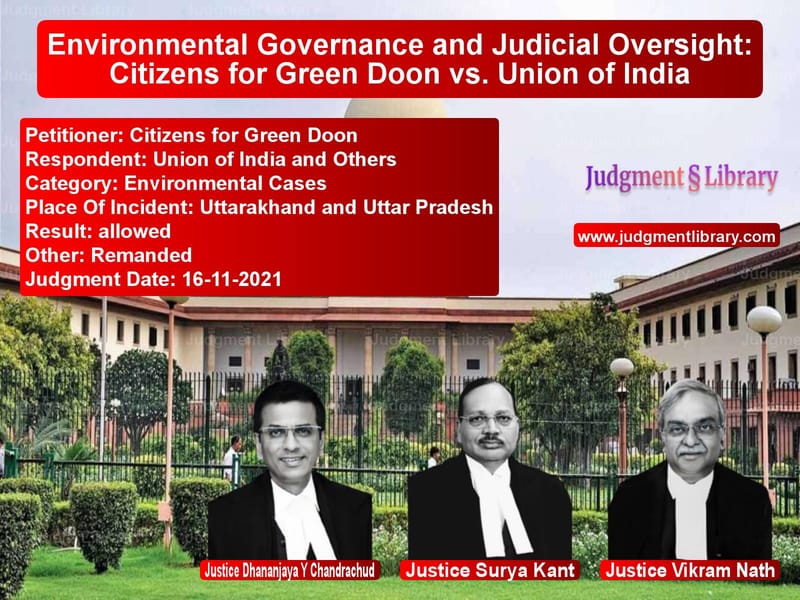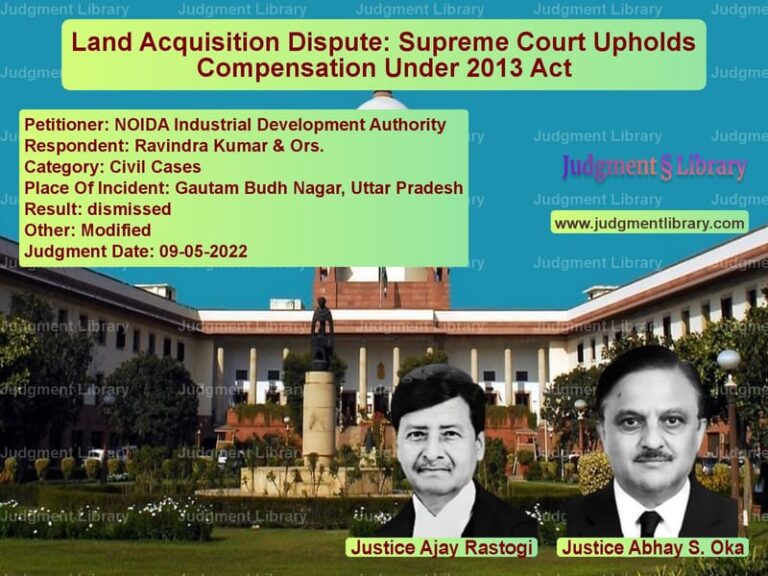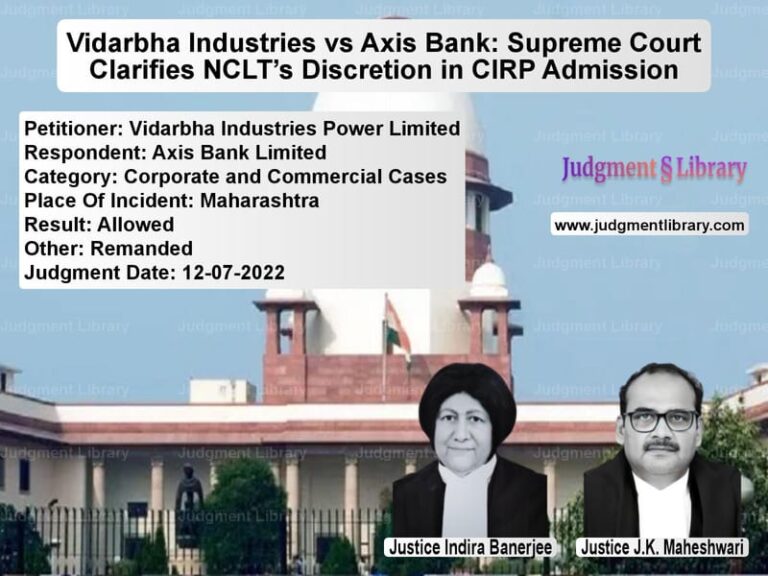Environmental Governance and Judicial Oversight: Citizens for Green Doon vs. Union of India
The case of Citizens for Green Doon vs. Union of India brought into focus critical issues surrounding environmental governance, public participation, and judicial oversight in large-scale infrastructure projects. The Supreme Court, in its judgment dated 16 November 2021, examined the legality of forest and wildlife clearances granted for road expansion projects in Uttarakhand and Uttar Pradesh.
The petitioners challenged the environmental approvals granted for portions of National Highway No. 72A, arguing that due process was not followed, and that tree felling permissions were granted in a non-transparent manner. The Court reviewed the decisions of the National Green Tribunal (NGT) and the authorities involved, ultimately restoring the petitioners’ right to challenge the permissions before the NGT.
Background of the Case
The case arose when the appellant, Citizens for Green Doon, challenged the Stage-I Forest Clearances and Wildlife Clearances granted by the Ministry of Environment, Forest and Climate Change (MoEF&CC). Initially, the Supreme Court directed the appellants to move the NGT for relief.
The NGT, however, dismissed the petition, stating that the appellants had attempted to circumvent the appellate jurisdiction under Section 16 of the NGT Act by filing a direct challenge under its original jurisdiction. The Tribunal reasoned that since Stage-I approval itself grants permission for tree felling, no further intervention was necessary.
Arguments by the Petitioners
The petitioners, represented by senior counsel Ms. Anitha Shenoy, made the following arguments:
- Under the Forest (Conservation) Act, 1980, only an order by the State Government or another authority under Section 2 is subject to appeal before the NGT.
- The 2015 circular of the MoEF&CC states that tree cutting permissions require specific approval from the competent authority, which must be placed in the public domain. In this case, no such order was made public.
- When an RTI application was filed seeking information on whether tree cutting permission was granted, the Divisional Forest Officer (DFO) responded that no such order existed.
- However, during the Supreme Court proceedings, the respondents submitted an order dated 27 August 2021, granting permission for tree felling. This indicated a lack of transparency.
Arguments by the Respondents
The respondents, represented by the Attorney General for India, Mr. K.K. Venugopal, countered the petitioners’ claims with the following arguments:
- Both Stage-I and Stage-II clearances for the project had been placed on the MoEF&CC website.
- The permission for tree cutting was granted by the DFO on 27 August 2021, fulfilling the requirements of the 2015 circular.
- The project included significant environmental safeguards, such as a 12-kilometer elevated corridor for wildlife movement.
- The NGT was justified in dismissing the petition, as the petitioners had an alternate remedy of appeal.
Supreme Court’s Observations
The Supreme Court analyzed the arguments and the legal provisions governing environmental clearances. The Court noted that:
- The 2015 MoEF&CC circular mandates that tree cutting permissions must be placed in the public domain.
- The DFO’s response to the RTI query, denying the existence of a tree cutting order, was misleading and inconsistent with the subsequently submitted order dated 27 August 2021.
- Transparency in environmental governance is essential, and the failure to disclose relevant permissions deprives affected parties of their right to challenge such decisions.
In this regard, the Court emphasized the concept of “environmental rule of law”, stating:
“The environmental rule of law seeks to create essential tools — conceptual, procedural, and institutional — to bring structure to the discourse on environmental protection… It fosters a regime of open, accountable, and transparent decision-making on concerns of the environment.”
Read also: https://judgmentlibrary.com/supreme-court-modifies-ngts-order-on-bihar-sand-mining-regulations/
Judgment and Directions
The Supreme Court set aside the NGT’s order and restored the petitioners’ right to challenge the tree felling permissions before the Tribunal. The Court also granted an interim stay on further tree felling until 26 November 2021, allowing the petitioners time to file their appeal.
Additionally, the Court directed:
- The Tribunal must hear the appeal on merits without dismissing it on procedural grounds.
- The petitioners must submit their detailed objections to the Tribunal.
- The Tribunal must pass a reasoned order addressing each of the objections raised.
Implications of the Judgment
This ruling reinforces the importance of procedural transparency in environmental clearances. Key takeaways include:
- Public Participation: Environmental decisions must be placed in the public domain to allow stakeholders to challenge them.
- Judicial Oversight: Courts and tribunals must ensure that environmental clearances adhere to legal requirements.
- Government Accountability: Authorities must provide accurate and timely information regarding permissions and clearances.
By restoring the petitioners’ right to appeal, the Supreme Court underscored its commitment to ensuring that environmental governance is conducted in an open and accountable manner.
Petitioner Name: Citizens for Green Doon.Respondent Name: Union of India and Others.Judgment By: Justice Dhananjaya Y Chandrachud, Justice Surya Kant, Justice Vikram Nath.Place Of Incident: Uttarakhand and Uttar Pradesh.Judgment Date: 16-11-2021.
Don’t miss out on the full details! Download the complete judgment in PDF format below and gain valuable insights instantly!
Download Judgment: citizens-for-green-d-vs-union-of-india-and-o-supreme-court-of-india-judgment-dated-16-11-2021.pdf
Directly Download Judgment: Directly download this Judgment
See all petitions in Environmental Cases
See all petitions in Judgment by Dhananjaya Y Chandrachud
See all petitions in Judgment by Surya Kant
See all petitions in Judgment by Vikram Nath
See all petitions in allowed
See all petitions in Remanded
See all petitions in supreme court of India judgments November 2021
See all petitions in 2021 judgments
See all posts in Environmental Cases Category
See all allowed petitions in Environmental Cases Category
See all Dismissed petitions in Environmental Cases Category
See all partially allowed petitions in Environmental Cases Category







